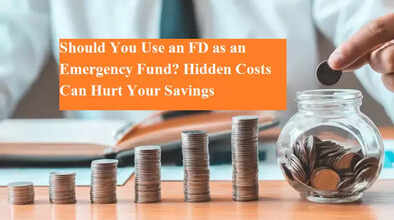Should You Use an FD as an Emergency Fund? Hidden Costs Can Hurt Your Savings

Many people assume a Fixed Deposit (FD) is a safe place to park their emergency fund. While it’s true that FDs offer guaranteed returns and capital safety, they may not be the best choice when you need instant access to cash. Breaking an FD before maturity often leads to penalty charges, reduced interest earnings, and lost compounding benefits—all of which can hurt your finances during a crisis.
A Costly Lesson in Premature FD Withdrawal
Chartered Accountant Nitin Kaushik recently shared a real-life example of why FDs may not be ideal for emergencies.
A woman had four FDs with more than 18 months left until maturity. When her father suddenly required surgery, she had no choice but to withdraw her FD funds early.
The result?
-
Penalty charges: 0.5%–1% deducted from the interest rate.
-
Reduced returns: Loss of two years’ worth of compounding benefits.
-
Net loss: ₹25,000 from her savings.
Instead of serving as a financial safety net, her FD withdrawal ended up costing her significantly.
Why FDs Are Not the Best Emergency Fund
Kaushik explains that while FDs are great for preserving capital, they are not designed for quick liquidity. Key drawbacks include:
-
Premature withdrawal penalties – Banks typically charge 0.5% to 1% on early withdrawals.
-
Loss of interest – Reduced rates mean you earn less than expected.
-
Not instantly accessible – Processing time can delay urgent payments.
Better Alternatives for Emergency Funds
If your goal is to access cash without penalty during unexpected situations, consider these options instead:
-
Liquid mutual funds: Provide quick redemption (often within 24 hours) without heavy charges.
-
Sweep-in FDs: Link your FD to a savings account so funds are auto-transferred when needed, without breaking the entire deposit.
-
Dedicated emergency savings account: Maintain at least 6 months’ worth of expenses in a separate high-liquidity account.
-
Medical credit cards or health insurance top-ups: Serve as an additional backup during health-related emergencies.
The Real Purpose of an Emergency Fund
The primary role of an emergency fund is not to generate high returns, but to give you peace of mind—ensuring you can access money instantly without suffering financial losses.
While an FD might look safe on paper, the hidden costs of breaking it early can turn your emergency into an even bigger financial setback. Opt for more liquid and penalty-free instruments for genuine financial security.

